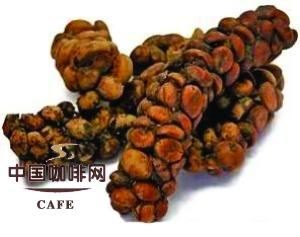The making process of Kopi Luwak the principle of Muscat Coffee

Muscat Coffee (Kopi Luwak), Kopi (Indonesian, coffee), Luwak refers to a kind of arboreal wild animal commonly known as "civet" in Indonesia. Civet coffee is the most expensive coffee in the world, with a price of several hundred US dollars per pound. It is extracted from the feces of the civet and processed. The civet eats the ripe coffee fruit and is excreted through the digestive system. Due to the fermentation of the stomach, the coffee produced has a special taste and has become a hot item in the international market.
Coffee principle
Luwak likes to choose the most ripe, sweet, juicy coffee fruit in the coffee tree as food. The coffee fruit passes through its digestive system, digesting only the pulp on the outside of the fruit, and the hard coffee beans are then excreted intact by Luwak's digestive system. This digestion process, so that coffee beans have an unparalleled magical change, the flavor tends to be unique, the taste is particularly mellow, rich and round sweet taste is also unmatched by other coffee beans. This is because Luwak's digestive system destroys the protein in the coffee beans, making the coffee much less bitter due to the protein, but adding to the round taste of the coffee beans.
Experts say there is a gland near the sexual organs of Luwak in Indonesia, which secretes milky oil, which has always been a precious raw material for the perfume industry. Even Shakespeare's play King Lear has this dialogue: "Please give me some Luwak sesame oil to stimulate my inspiration." Others said, "this coffee is unique and is a specialty of Indonesia." Drink it, it's like finding a diamond in a stone. " Because wild Luwak is obviously better at selecting good coffee fruits, which makes this kind of coffee have outstanding characteristics.
Luwak likes to choose the most ripe, sweet, juicy coffee fruit in the coffee tree as food. The coffee fruit passes through its digestive system, digesting only the pulp on the outside of the fruit, and the hard coffee beans are then excreted intact by Luwak's digestive system. This digestion process, so that coffee beans have an unparalleled magical change, the flavor tends to be unique, the taste is particularly mellow, rich and round sweet taste is also unmatched by other coffee beans. This is because Luwak's digestive system destroys the protein in the coffee beans, making the coffee much less bitter due to the protein, but adding to the round taste of the coffee beans.
Experts say there is a gland near the sexual organs of Luwak in Indonesia, which secretes milky oil, which has always been a precious raw material for the perfume industry. Even Shakespeare's play King Lear has this dialogue: "Please give me some Luwak sesame oil to stimulate my inspiration." Others said, "this coffee is unique and is a specialty of Indonesia." Drink it, it's like finding a diamond in a stone. " Because wild Luwak is obviously better at selecting good coffee fruits, which makes this kind of coffee have outstanding characteristics.
Kopi Luwak, produced in Indonesia, is one of the most expensive coffee in the world. Indonesia grows a lot of coffee crops, including wild animals called civets, omnivores, pointed mouths and dark gray fur. The favorite food is fresh coffee beans, which are fermented and digested in the body and eventually become the feces of cats. Feces are grains of coffee beans and become the most expensive feces in the world. Because the quantity is very rare, so the price is very expensive.
After processing and baking, Kopi Luwak has become a luxury coffee drink and spread to luxury kingdoms around the world. Local coffee farmers, in pursuit of high profits, bring wild civets home to raise them so that they can produce more Kopi Luwak. However, the Kopi Luwak produced by breeding civets will be much worse in color and taste. Even so, the output of this kind of coffee is still very rare, and it is not affordable for all people who like coffee.
This coffee comes from the excrement of an animal called Luwak (commonly known as civet in Indonesia). Although it comes from smelly poop, it is full of sweetness and a burst of indescribable sweetness. This wild musk cat likes to eat fat, multi-paddled coffee fruits, but the hard hard nuts (raw beans) cannot be digested and are excreted with feces. After being cleaned, they become Kopi Luwak coffee raw beans! So many people call it "cat shit" coffee. Indonesians found that the coffee beans fermented by the civets' intestines and stomach are particularly thick and mellow, so they collect civets' feces, sift out the coffee beans and brew them to drink. Because the yield is rare and the fermentation process is unique, the flavor is very different from that of ordinary coffee. Traditionally, coffee fruit is washed or tanned to remove the peel, pulp and sheep skin, and finally take out the coffee beans. however, Luwak uses natural fermentation in the body to remove the coffee beans, so it has a special flavor.
It is said that coffee farmers in early Indonesia regarded civet cats that ate ripe coffee fruits as mortal enemies, but at some point someone began to think of picking coffee beans from the civet droppings to make coffee with unique flavor. Coffee experts everywhere have tried and were amazed. Since then, local farmers spend a lot of time collecting civet droppings in the forest every day during the coffee ripening season. .
Important Notice :
前街咖啡 FrontStreet Coffee has moved to new addredd:
FrontStreet Coffee Address: 315,Donghua East Road,GuangZhou
Tel:020 38364473
- Prev

The Development of Kopi Luwak Culture Coffee Musk Coffee
M.P. Mountanos, which first introduced Kopi Luwak coffee to the United States in the course of development, pointed out that at first, when I heard about this kind of coffee fermented in the body, I thought it was a joke in the industry, but I didn't take it seriously. later, I saw a special report on Kopi Luwak in National Geographic Magazine and became interested in her. it took seven years to find a stable source of supply and began to quote in a small amount.
- Next

Colombian Gesa Coffee characteristic Rose Summer Coffee
Geisha is an Arabica coffee variety from Geisha Mountain in southwestern Ethiopia, which is transliterated as Gesha. Because the Japanese pronunciation of geisha is similar to Geisha, Geisha is called geisha coffee in Japan. I think it is easier to communicate with foreign countries by transliteration. According to the Panamanian Emerald Manor website, Gaixia Coffee Seeds began in 1931.
Related
- Detailed explanation of Jadeite planting Land in Panamanian Jadeite Manor introduction to the grading system of Jadeite competitive bidding, Red bid, Green bid and Rose Summer
- Story of Coffee planting in Brenka region of Costa Rica Stonehenge Manor anaerobic heavy honey treatment of flavor mouth
- What's on the barrel of Blue Mountain Coffee beans?
- Can American coffee also pull flowers? How to use hot American style to pull out a good-looking pattern?
- Can you make a cold extract with coffee beans? What is the right proportion for cold-extracted coffee formula?
- Indonesian PWN Gold Mandrine Coffee Origin Features Flavor How to Chong? Mandolin coffee is American.
- A brief introduction to the flavor characteristics of Brazilian yellow bourbon coffee beans
- What is the effect of different water quality on the flavor of cold-extracted coffee? What kind of water is best for brewing coffee?
- Why do you think of Rose Summer whenever you mention Panamanian coffee?
- Introduction to the characteristics of authentic blue mountain coffee bean producing areas? What is the CIB Coffee Authority in Jamaica?

